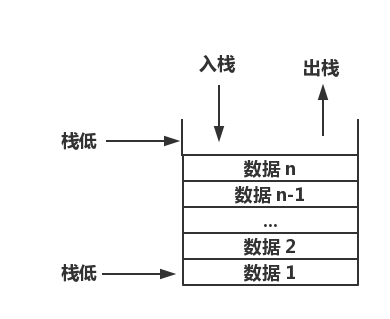栈结构
栈(Stack)是从数据的运算来分类的,按照 后进先出(Last In First Out,LIFO) 的原则处理节点数据的;在终端处理特别是重要数据的现场保护有着重要意义。而从数据的逻辑结构来看,栈结构其实就是一种线性结构。栈结构包括两类:

栈结构包括两类
- 顺序栈结构
- 链式栈结构
(顺序)栈操作实例代码
数据准备
定义(顺序)栈结构
1
2
3
4
5
6
7
8
9
10
11
12
13
14
15
16
17
18
19
20
21
22
23
24
25
|
#define MAX_LEN 100
typedef enum {
Ret_Error = -1,
Ret_NO = 0,
Ret_YES = 1,
}RetValue;
typedef struct {
char key[15];
char name[20];
int age;
}NodeData;
typedef struct {
NodeData stackData[MAX_LEN];
int stackTop;
}SSType;
|
(顺序)相关操作
(顺序)栈初始化
1
2
3
4
5
6
7
8
9
10
11
| SSType* StackInit()
{
SSType *pStack;
if (!(pStack = (SSType *)malloc(sizeof(SSType))))
{
printf("无法分配栈内存,栈初始化失败!\n");
return NULL;
}
pStack->stackTop = 0;
return pStack;
}
|
(顺序)栈为空判断
1
2
3
4
5
6
7
8
9
10
11
12
13
14
15
16
17
| RetValue StackIsEmpty(SSType* pStack)
{
if (NULL == pStack)
{
printf("栈指针不存在,无法进行为空判断!\n");
return Ret_Error;
}
if (0 == pStack->stackTop)
{
return Ret_YES;
}
else
{
return Ret_NO;
}
}
|
(顺序)栈填满判断
1
2
3
4
5
6
7
8
9
10
11
12
13
14
15
16
17
| RetValue StackIsFull(SSType* pStack)
{
if (NULL == pStack)
{
printf("栈指针不存在,无法进行填满判断!\n");
return Ret_Error;
}
if (MAX_LEN == pStack->stackTop)
{
return Ret_YES;
}
else
{
return Ret_NO;
}
}
|
(顺序)栈清空
1
2
3
4
5
6
7
8
9
10
11
| RetValue StackClear(SSType* pStack)
{
if (NULL == pStack)
{
printf("栈指针不存在,无法进行栈清空!\n");
return Ret_Error;
}
pStack->stackTop = 0;
return Ret_YES;
}
|
(顺序)栈释放
1
2
3
4
5
6
7
8
9
10
11
| RetValue StackFree(SSType* pStack)
{
if (NULL == pStack)
{
printf("栈指针不存在,无法进行栈释放!\n");
return Ret_Error;
}
free(pStack);
return Ret_YES;
}
|
入(顺序)栈
1
2
3
4
5
6
7
8
9
10
11
12
13
14
15
16
17
18
| RetValue StackPush(SSType* pStack, NodeData nData)
{
if (NULL == pStack)
{
printf("栈指针不存在,无法入栈!\n");
return Ret_Error;
}
if (Ret_YES == StackIsFull(pStack))
{
printf("栈已满,无法入栈!\n");
return Ret_Error;
}
pStack->stackData[pStack->stackTop] = nData;
pStack->stackTop++;
return Ret_YES;
}
|
出(顺序)栈
1
2
3
4
5
6
7
8
9
10
11
12
13
14
15
16
17
18
| RetValue StackPop(SSType* pStack, NodeData* nData)
{
if (NULL == pStack)
{
printf("栈指针不存在,无法出栈!\n");
return Ret_Error;
}
if (Ret_YES == StackIsEmpty(pStack))
{
printf("栈为空,无法出栈!\n");
return Ret_Error;
}
pStack->stackTop--;
*nData = pStack->stackData[pStack->stackTop];
return Ret_YES;
}
|
读取(顺序)栈顶节点数据
1
2
3
4
5
6
7
8
9
10
11
12
13
14
15
16
17
| RetValue StackPeek(SSType* pStack, NodeData* peekData)
{
if (NULL == pStack)
{
printf("栈指针不存在,无法读取栈顶数据!\n");
return Ret_Error;
}
if (Ret_YES == StackIsEmpty(pStack))
{
printf("栈为空,栈顶数据不存在!\n");
return Ret_Error;
}
*peekData = pStack->stackData[pStack->stackTop - 1];
return Ret_YES;
}
|
显示(顺序)栈所有数据
1
2
3
4
5
6
7
8
9
10
11
12
13
14
15
16
17
18
19
| RetValue StackShowAll(SSType* pStack)
{
if (NULL == pStack)
{
printf("栈指针不存在,无法显示栈所有数据!\n");
return Ret_Error;
}
if (Ret_YES == StackIsEmpty(pStack))
{
printf("栈为空,栈数据不存在!\n");
return Ret_Error;
}
for (int i = 0; i < pStack->stackTop; i++)
{
printf("key = %-15s name = %-20s age = %d\n", pStack->stackData[i].key, pStack->stackData[i].name, pStack->stackData[i].age);
}
return Ret_YES;
}
|
(链式)栈操作实例代码
数据准备
定义(链式)栈结构
1
2
3
4
5
6
7
8
9
10
11
12
13
14
15
16
17
18
19
20
21
22
|
typedef enum {
RetError = -1,
RetFailure = 0,
RetSuccess = 1,
}RetValue;
typedef struct {
char key[15];
char name[20];
int age;
}NodeData;
typedef struct node {
NodeData nodeData;
struct node* nextNode;
}LSType;
|
定义“头”结构
1
2
3
4
5
6
|
typedef struct _head {
LSType* headNode;
LSType* tailNode;
unsigned int clLength;
}Head;
|
(链式)相关操作
(链式)栈初始化
1
2
3
4
5
6
7
8
9
10
11
12
13
14
| Head* LStackInit()
{
Head* pHead;
if (!(pHead = (Head*)malloc(sizeof(Head))))
{
printf("无法分配栈头指针内存,(链式)栈初始化失败!\n");
return NULL;
}
pHead->headNode = NULL;
pHead->tailNode = NULL;
pHead->clLength = 0;
return pHead;
}
|
入(链式)栈
1
2
3
4
5
6
7
8
9
10
11
12
13
14
15
16
17
18
19
20
21
22
23
24
25
26
27
28
| RetValue LStackPush(Head* pHead, NodeData inData)
{
if (NULL == pHead)
{
printf("(链式)栈指针不存在,无法入栈\n");
return RetError;
}
LSType* newNode;
if (!(newNode = (LSType*) malloc(sizeof(LSType))))
{
printf("新添加结点内存申请失败,无法入栈!\n");
return RetFailure;
}
newNode->nodeData = inData;
newNode->nextNode = NULL;
if (NULL == pHead->tailNode)
{
pHead->headNode = newNode;
}
else
{
pHead->tailNode->nextNode = newNode;
}
pHead->tailNode = newNode;
pHead->clLength++;
return RetSuccess;
}
|
出(链式)栈
1
2
3
4
5
6
7
8
9
10
11
12
13
14
15
16
17
18
19
20
21
22
23
24
25
26
27
28
29
30
| RetValue LStackPop(Head* pHead, NodeData* outData)
{
if (NULL == pHead)
{
printf("(链式)栈指针不存在,无法入栈\n");
return RetError;
}
if (NULL == pHead->tailNode)
{
printf("栈内无结点,无法出栈!\n");
return RetFailure;
}
memcpy(outData, &pHead->tailNode->nodeData, sizeof(NodeData));
LSType* tempHead = pHead->headNode;
LSType* deleteNode = pHead->headNode;
while (NULL != deleteNode->nextNode)
{
tempHead = deleteNode;
deleteNode = tempHead->nextNode;
}
tempHead->nextNode = NULL;
pHead->tailNode = tempHead;
pHead->clLength--;
free(deleteNode);
return RetSuccess;
}
|
判断(链式)栈是否为空
1
2
3
4
5
6
7
8
9
10
11
12
13
| RetValue LStackIsEmpty(Head* pHead)
{
if (NULL == pHead)
{
printf("(链式)栈指针不存在,无法进行为空判断!\n");
return RetError;
}
if (0 == pHead->clLength)
{
return RetSuccess;
}
return RetFailure;
}
|
销毁(链式)栈
1
2
3
4
5
6
7
8
9
10
11
12
13
14
15
16
17
18
19
20
| RetValue LStackDestroy(Head* pHead)
{
if (NULL == pHead)
{
printf("(链式)栈指针不存在,无法销毁栈\n");
return RetError;
}
LSType* tempHead;
while (pHead->headNode)
{
tempHead = pHead->headNode;
pHead->headNode = pHead->headNode->nextNode;
free(tempHead);
}
pHead->tailNode = NULL;
pHead->headNode = NULL;
free(pHead);
return RetSuccess;
}
|
读取(链式)栈顶数据
1
2
3
4
5
6
7
8
9
10
11
12
13
14
15
16
17
| RetValue LStackPeek(Head* pHead, NodeData* peekData)
{
if (NULL == pHead)
{
printf("(链式)栈指针不存在,无法读取栈顶数据!\n");
return RetError;
}
if (RetSuccess == LStackIsEmpty(pHead))
{
printf("(链式)栈为空,栈顶数据不存在!\n");
return RetError;
}
*peekData = pHead->tailNode->nodeData;
return RetSuccess;
}
|
显示(链式)栈所有结点数据
1
2
3
4
5
6
7
8
9
10
11
12
13
14
15
16
17
18
19
20
| RetValue LStackShowAll(Head* pHead)
{
if (NULL == pHead)
{
printf("(链式)栈指针不存在,无法显示栈所有数据!\n");
return RetError;
}
if (RetSuccess == LStackIsEmpty(pHead))
{
printf("(链式)栈为空,栈数据不存在!\n");
return RetFailure;
}
LSType* tempHead = pHead->headNode;
while (tempHead)
{
printf("key = %-15s name = %-20s age = %d\n", tempHead->nodeData.key, tempHead->nodeData.name, tempHead->nodeData.age);
tempHead = tempHead->nextNode;
}
return RetSuccess;
}
|


